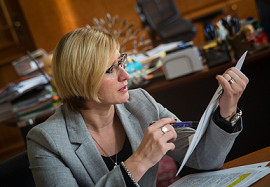
The law change follows recent law suits in France (2010) and Israel (2012) that also banned human bodies exhibitions for the same reason: inability on the side of promoters to supply evidence regarding the consent of the deceased people to use their bodies after death.
There are also reasonable concerns that the corpses have been acquired illegally. Some experts point out to Chinese prisoners of conscience as the possible origin of the bodies.
This legal loop will not be possible now according to the new amendment which clearly says that “neither any human bodies nor their parts, regardless of whether they have been separated from the bodies or not“ can be classified as objects.
Since the exhibition promoters around the world have never been able to supply this legal consent, the new law effectively makes it impossible to have any more plastinated bodies being put on show in the central European country.
The Bodies: The Exhibition was relentlesly criticised by the Prague 7 mayor, Jan Cizinsky who ordered the corpses to be buried. Czech police refused to act on that order claiming there is no legal precedent for it.
Related article:
The Czech Republic joined the ranks of countries which ensure the protection of deceased persons as well as dignified treatment of their bodies. Past several years have seen growing resistance against the controversial exhibitions of human corpses around the world. The promoters of these exhibits that use plastinated bodies from China have failed to show written consents of the deceased permitting their bodies to be used after death.
Showing such a consent will be needed for any exhibition organizer wishing to publicly exhibit dead human bodies in Czech Republic in the future, states the amendatory Burial Act that was promulgated July 7th of this year.
The law change follows recent law suits in France (2010) and Israel (2012) that also banned human bodies exhibitions for the same reason: inability on the side of promoters to supply evidence regarding the consent of the deceased people to use their bodies after death.
There are also reasonable concerns that the corpses have been acquired illegally. Some experts point out to Chinese prisoners of conscience as the possible origin of the bodies.
JVS Group, the Czech promoter of the last Bodies: The Exhibition which ended in July 2017 showed the local police only custom documents claiming the bodies were exhibits for which no proof of origin or consent with their handling is needed.
This legal loop will not be possible now according to the new amendment which clearly says that “neither any human bodies nor their parts, regardless of whether they have been separated from the bodies or not“ can be classified as objects.
Since the exhibition promoters around the world have never been able to supply this legal consent, the new law effectively makes it impossible to have any more plastinated bodies being put on show in the central European country.
Before the exhibition in Prague finished, a Canadian Chinese who learned of the event from media abroad, came to the Czech capital to lodge a criminal complaint against the organizers. Huang Wanqing said he suspects one of the exhibited bodies to belong to his brother who went missing in the Chinese prison system.
The Bodies: The Exhibition was relentlesly criticised by the Prague 7 mayor, Jan Cizinsky who ordered the corpses to be buried. Czech police refused to act on that order claiming there is no legal precedent for it.
A number of Czech medical associations, including Czech Medical Chamber, also voiced their objections calling the exhibition unethical and immoral. Protests were joined by human rights organizations in the country and the police received several criminal complaints.
In spite of that, the event went on for several months uninterrupted attracting dozens of thousands of people including primary school students, the fact of which was strongly criticized by the NGO Lidská práva bez hranic (Human Rights Without Borders) who warned schools against seeing the exhibits.
David Matas, one of the experts investigating the origin of the plastinated corpses, says the bodies are part of the transplant industry abuse in China. Matas, who came to visit Prague recently, said the Epoch Times that the bodies at the exhibition could belong to unnamed prisoners who upon arrest refused to reveal their identities as a way to protect their families and friends.
Matas is also the co-author of the Bloody Harvest and Bloody Harvest Update reports. According to his findings the Chinese authorities use prisoners of conscience including Falun Gong, underground Christians, Tibetans and Uyghurs as a convenient source of organs.
Ethan Gutmann who spent 7 year investigating forced organ harvesting in China thinks that to find out the true origin of the bodies, a court should order to take and test DNA samples from all the exhibited corpses and compare them with DNA samples of the missing Chinese or their relatives.
From Czech Republic, Body The Exhibition moved to the neighboring Slovakia where it‘s also meeting with similar resistance like in Prague.
Updated August 8th 2017












